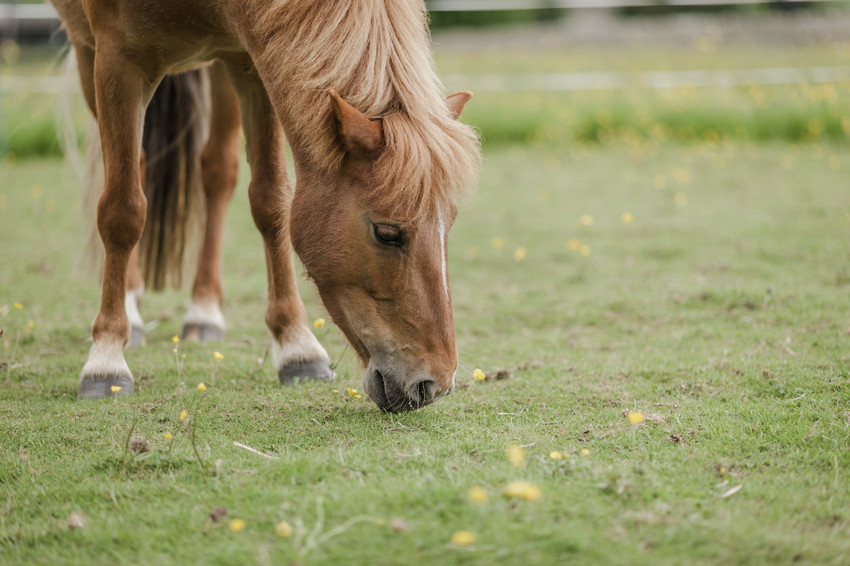
Horse obesity prevention and management
Obesity in horses and ponies is a growing welfare problem – approximately 50 to 70 per cent of the equine population is overweight.
Many owners may not realise their horse is overweight, but obesity can have huge health implications for their horse. Being obese puts horses at high risk of other conditions, including laminitis, which can be life-threatening. It's vital that horse obesity is prevented for a good quality of life.
Causes of obesity in horses
Horses in the wild survive on a low-quality fibre diet, covering many miles as they graze each day. Domestication has meant that we feed them more while letting them move less, causing them to become overweight. However, there are some other common causes of obesity:
- Lack of exercise
- Grazing with a higher calorie content
- Over-rugging
- High-energy supplementary feed and treats
- Insulin resistance
How to tell if your horse is overweight
Weighing your horse on a regular basis can help you to objectively spot if they are overweight. You can also monitor any gradual increases or drops in weight over time.
There are a number of methods for weighing a horse:
- Body scoring
- Using a horse weight tape
- Using a weight formula calculation
- Using a weighbridge
By using a combination of body scoring and a weight tape every two weeks, you can easily and affordably track your horse's weight over time. To keep your results consistent, make sure to use the same brand of weight tape each time.
Tip
Take regular photographs of your horse whenever you weigh them. This will help you to visually compare their weight overtime.
Health risks of horse obesity
Obesity can increase the risk of other health issues in horses. It's much better to prevent or avoid weight gain. But if your horse is overweight it's vital to stick to a strict weight loss programme to prevent further health risks.
Laminitis
Laminitis is damage to the sensitive laminae tissue found in the hoof. When the laminae weakens, it causes the pedal bone to rotate within the hoof. Obesity can more than double the risk of laminitis developing. It’s incredibly painful for a horse, and can result in lameness and permanent damage to the feet. In the most severe cases, the horse may need to be euthanised to prevent more suffering.
Equine Metabolic Syndrome (EMS)
Similar to type two diabetes in people, equine metabolic syndrome is a metabolic disorder linked to being overweight. The syndrome can change fat composition and metabolism, and can cause damage to blood vessels. It can also increase the risk of laminitis. Losing weight helps to protect horses from EMS, but there is no cure for the condition.
Arthritis
Arthritis is the painful inflammation and swelling of joints. As a degenerative disease, it will worsen over time. Obese horses are at higher risk of developing arthritis due to the constant strain on their joints.
Managing horse obesity
Obesity should be avoided to prevent further health risks from developing:
Review your grazing
Sugar levels in grass can vary throughout the year and even throughout the day, with levels at their highest in spring and early autumn - longer fibrous grazing may be more suitable than short fresh grass. You should consider the most appropriate grazing for your horse's needs. This may mean restricting your horse's grazing with strip grazing or a track system. Horses prone to laminitis may need to be removed from grass altogether.
Tip
If you're strip grazing your horse be aware that new grass given will have a higher sugar content.
Monitor nutritional intake
A balanced diet is essential to managing obesity. During the weight loss period, horses should ideally be fed one and a half per cent of their target body weight – this includes time spent grazing. Feed should be fibre-based, such as hay or low-energy chaff. Hay can also be soaked for at least four hours to reduce the sugar content. Nets with small holes can help to slow your horse down when feeding, making their reduced portions last longer. Alternatively, good quality straw can be fed as part of your horse's forage ration – it is a low calorie fibre source and can make your horse feel fuller.
Weighing feed – including forage – will help you to be as accurate as possible in managing nutritional intake. This daily ration should be spread throughout the day to prevent your horse being without food.
If your horse is on restricted grazing and a soaked-hay diet, consider feeding a balancer of essential vitamins and minerals.
Important
Grazing muzzles can be used to limit nutritional intake in the field. Muzzles must be fitted correctly and worn for a limited period of time. Be aware that some horses may gorge on forage once the muzzle has been removed.
Keep them moving
Exercise is vital for maintaining a healthy weight. For sound horses, regular exercise should form a big part of their weight loss routine. For unfit horses, activity levels should gradually increase – two short exercise sessions throughout the day will be less strenuous than one long session.
Unridden companion horses can also be exercised in-hand. Taking them for walks is a great way to keep them active while building your bond. Enrichment ‒ such as track systems, treat balls and obstacles ‒ can also be provided in fields to encourage horses to keep moving. Get creative with ways to avoid having them stay still while reducing their grass intake.
Remove rugs
An overweight horse has plenty of fat to stay warm. Rugging them unnecessarily can prevent the natural process of burning this fat and losing weight during colder weather. Remember that horses do not feel as cold as we do ‒ only use a rug when absolutely necessary (eg during heavy rain and wind, or if your horse is elderly).
Preventing horse obesity tips
Preventing obesity is key to keeping your horse healthy. You can prevent your horse from becoming overweight by:
- frequently weighing and body scoring your horse
- feeding a high-fibre, low-sugar diet
- restricting grazing
- maintaining a regular exercise routine and providing plenty of enrichment
- avoiding over-rugging
Page details
Reviewed
• 28 June 2023
Next review
• 26 June 2026






